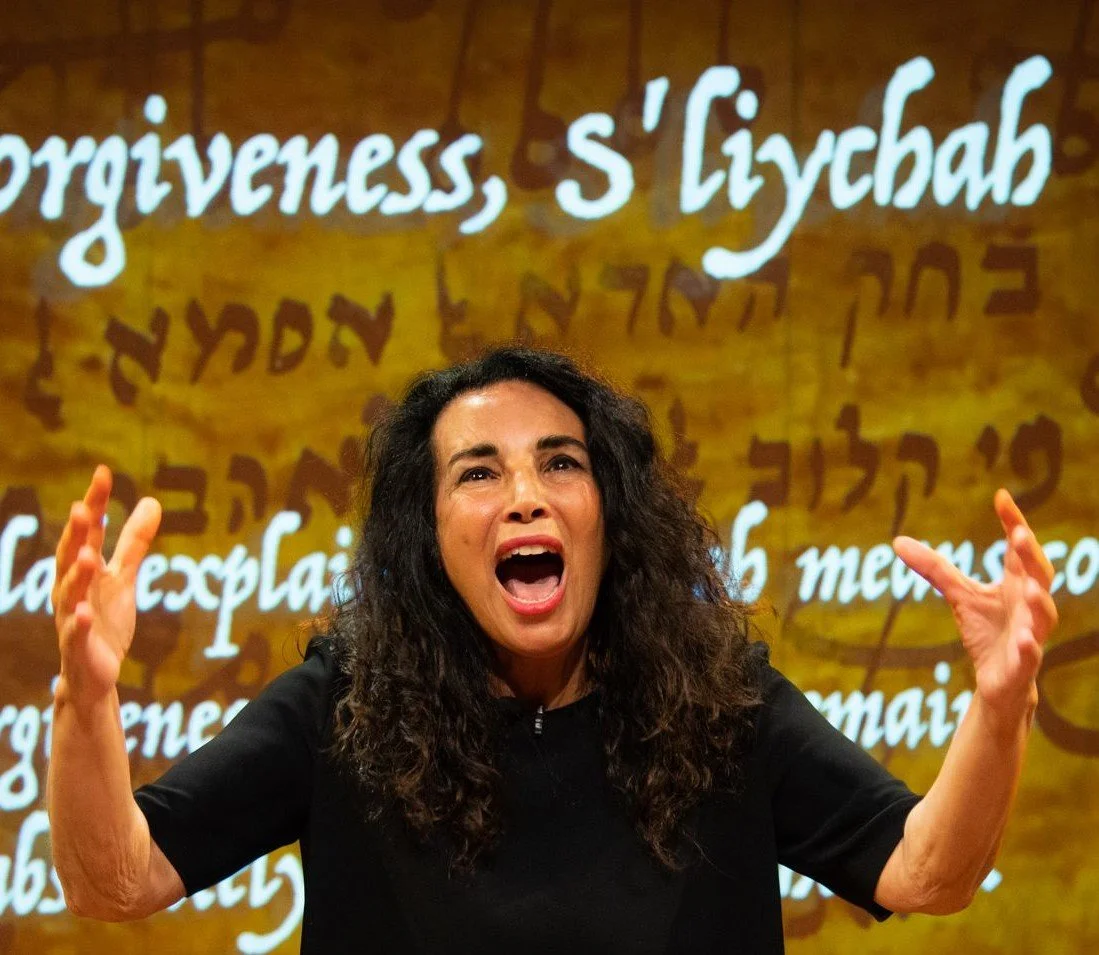Shanit Keter Schwartz grapples with the concept of forgiveness in her solo play Daughter of the Wicked.
The impending 75th anniversary of the declaration of Israel as an independent state has prompted many controversial discussions. Among them are retrospective conversations about the country’s early days and questions as to whether those who struggled to create a cohesive post-Holocaust multicultural society also permitted systematic mistreatment of some citizens. How, for example, is it possible to justify the abduction of Yemenite children and the resultant grief and trauma for their families? Daughter of the Wicked, Shanit Keter Schwartz’s solo autobiographical play, deals in large part with her Yemenite identity, her immigrant parents, and her search for her missing sister.
Keter Schwartz also portrays her father, as he debates with his rabbi. Photographs by Russ Rowland.
Director Zeke Rettman has given life to one woman’s physical, geographical, and spiritual odyssey and framed her story to afford it universal appeal. Intergenerational and ethnic conflict, grief, loss, resilience, religion, and reshaped identity are embedded in Keter Schwartz’s narrative. Her religious parents, like many Yemenite immigrants, come on “Operation Magic Carpet” to a new land. Among the largely European, highly secular, pre-Holocaust pioneer generation who work the land, establish kibbutzim, and fight for independence from the British, immigrants from Yemen, the Levant, and North Africa are regarded with suspicion. They are considered backwards, insular, superstitious undesirables and packed into projects with people who mock them.
Keter Schwartz reveals the humiliation of being treated as such. The photographs of early Yemenite dwellings (sound and media design by Fritz Davis) validate Keter Schwartz’s descriptions of Yemenite privation, overcrowding, and a proud culture of families whose customs and dress are incongruous with post-Mandate Israel. Underscoring the performance is riveting Yemenite music by Lilo Fedida; songs by Ofra Haza bookend the performance itself. Helped by wardrobe changes, music shifts, and dance moves (the choreography is by Kate Coleman), Keter Schwartz segues between narratives of her life in a discordant family within a displaced people and Kabbalistic themes, such as forgiveness. A projection in Hebrew reads, “The Kabbalah explains s’liychah means complete forgiveness so that there remains absolutely no trace of the sin.”
In spite of the cultural domestic tensions that Keter Schwartz recounts—an otherworldly father, an overworked, verbally abusive mother, and extreme poverty—Keter Schwartz explains that “I don’t blame my parents any longer. They came to Israel from Yemen; they were seen as savages, primitive, inferior.… It was a collective trauma.”
The most dramatic thread that weaves its way through the play is the mystery of Sara, the twin of Keter Schwartz’s brother David. Sara is the reason that Keter Schwartz, an actress in Los Angeles and a middle-aged wife and mother of two, is returning to Israel. For generations the Israeli government has been accused of taking babies from Yemenite families, giving them to childless Ashkenazi families for adoption, and sealing the adoption records, but the government does not acknowledge that practice. The nurses have told her father that Sara is dead, but there is neither a body nor a death certificate, so Keter Schwartz hires Moshe—“The Best in the West,” as he calls himself—to investigate and hopefully locate her sister.
Keter Schwartz’s narrative alternates back and forth among Los Angeles (it appears as an illuminated backdrop), her home in Yemen, a kibbutz in Israel, the Netherlands—where she worked as an au pair—and New York. With each phone call from Moshe and each ring of the doorbell, her hopes that Sara will appear at her home are raised and then dashed.
“Director Zeke Rettman has given life to one woman’s physical, geographical, and spiritual odyssey.”
Much of what makes Keter Schwartz seethe is the way her father, a rabbi, passively and unquestioningly submits to the authority of the hospital staff and the official story about Sara’s death, not unlike other Yemenites who have similarly lost their children. Also, his obliviousness to worldly matters enrages her, but she is finally able to come to terms with his nature as someone who is “wired” to be a scholar. She is even proud of his work.
Through a multi-textured multimedia, art, and music montage, one understands Keter Schwartz’s initial rage that, like many other Yemenites of his generation, her father never challenges those who have kept him and his community unempowered and impoverished. Yet the life she creates as a proud secular Yemenite, striving to locate a loved but lost sister, attempts to reverse a long-standing injustice. Does she find Sara? When the stage goes black, we still don’t know.
Daughter of the Wicked runs at New York City Center Stage II through May 14. Performances are Wednesdays through Saturdays at 7:30 and Sundays at 3 p.m. For tickets, or for more information, call the box office at (212) 581-1212 or visit nycitycenter.org/events-tickets.
Playwright: Shanit Keter Schwartz
Direction: Zeke Rettman
Choreography: Katie Coleman
Music: James Newton Howard
Yemenite theme music: Lilo Fedida
Lighting: Daisy Long
Media and sound design: Fritz Davis




